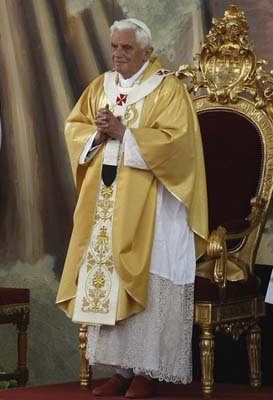Pope's Holocaust speech stirs controversy in Israel
 Jerusalem - Pope Benedict XVI's landmark visit to the Holy Land found itself overshadowed Tuesday by a dispute over his remarks at the Yad Vashem Holocaust Memorial Centre, with critics complaining that the pope's speech lacked content and fell short of expectations.
Jerusalem - Pope Benedict XVI's landmark visit to the Holy Land found itself overshadowed Tuesday by a dispute over his remarks at the Yad Vashem Holocaust Memorial Centre, with critics complaining that the pope's speech lacked content and fell short of expectations.
Benedict's visit to the centre hours after he arrived in Israel Monday was especially sensitive, given the tensions between Israel and the Vatican in the light of the Catholic Church's disputed actions during the Nazi era, and his own decision to readmit a Holocaust-denying bishop into the church.
In his remarks at the Yad Vashem Hall of Remembrance, a sombre Benedict used the opportunity to denounce Holocaust denial, and to ask that the names of the victims "never perish."
Almost as soon as the pontiff had finished speaking, Yad Vashem officials and Holocaust survivors began expressing disappointment that he had not referred to Nazis, and had not specifically mentioned that six million Jews were murdered.
Yad Vashem Chairman Avner Shalev said he had expected the German- born Benedict to draw on his personal experience to issue a stronger condemnation of Nazis and Germans.
Tel Aviv Chief Rabbi Yisrael Meir Lau, chairman of the Yad Vashem Council and himself a Holocaust survivor, also criticised the speech, saying it was devoid of "any compassion, any regret, any pain over the horrible tragedy of the six million victims."
In his remarks at Yad Vashem the pope had made a point of saying that the Catholic Church "feels deep compassion for the victims remembered here."
Ruby Rivlin, speaker of the Israeli Knesset, joined in the controversy Tuesday, using Benedict's wartime experiences as the basis for his criticism.
"He came and told us as if he were a historian, someone looking in from the sidelines, about things that should not have happened. And what can you do? He was a part of them," Rivlin said.
The debate also spilled over into the media. Historian Tom Segev, writing in the Ha'aretz daily, said Benedict's remarks about the Holocaust "sounded too calculated, too diplomatic and professional - he advised 'compassion,' a prescription that is to priests what aspirin is to general practitioners."
Director of the Vatican Press Office, Father Fredriko Lombardi, Vatican spokesman, defended the pope's Yad Vashem address, saying the main point of the speech had been the need to uphold the memory of the victims of the Holocaust and "not to forget."
He pointed out that upon his arrival in Israel late Monday morning Benedict had made a reference to the 6 million Jews killed by the Nazis.
He added that the Pope had referred to his German background in other addresses made on various occasions, including one at the synagogue of Cologne and another at the Auschwitz death camp.
"He did not think he would have to repeat all the time in every speech all the points that are being made," Lombadri said.
Lombadri also also vehemently denied that Benedict, as a teenager, had been a member of the Hitler Youth, as has been widely reported by the media and used by some, as a basis for criticizing the pope's Yad Vashem address.
"The Pope was never in the Hitler Jugend, never never never," he told a news conference in Jerusalem, describing the Hitler Youth as a group of fanatic volunteers, whereas German-born Joseph Ratzinger had been forced at the age of 16 to join an auxiliary anti-aircraft force to defend his hometown against aerial bombings.
Motti Levy, Israel's ambassador to the Vatican, said he saw the pope's Yad Vashem appearance "more as a religious message than a political one."
Support for the Pope also came from Noah Frug, chairman of the Union of Holocaust Survivors, who said the criticism was exaggerated.
The pope, he said, "is not the president of a Zionist organization, so why should we have any complaints towards him?"
"He came here to bring the Church and Judaism closer together, and we should consider his visit positive and important," Frug said. (dpa)